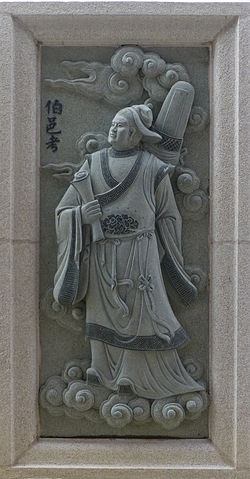
Back Boyi Kao Catalan Bo Yikao Spanish Boyi Kao French Bo Yikao ID Bo Yikao Italian 伯邑考 Japanese 백읍고 Korean Boyi Kao Portuguese ปั๋ว อี้เข่า Thai 伯邑考 Chinese

| Bo Yikao | |||||||||
|---|---|---|---|---|---|---|---|---|---|
| Chinese | 伯邑考 | ||||||||
| |||||||||
Bo Yikao was the eldest son of King Wen of Zhou and the elder brother of King Wu who was the founder of the Zhou dynasty of ancient China.
As a member of the Zhou royal house, his family name was Ji (姬). 伯; Bó refers to his status as the oldest son of his father; 邑; Yì may have been his personal name's element or a posthumous name used for ritual purposes; 考; Kǎo either means "long-lived"[1] or is a posthumous epithet used to refer to a deceased father.[2]
It is known that he did not inherit his father's realm along the Wei River. Based on later Chinese inheritance laws and legends, it is typically thought that he predeceased his father, e.g. by Sima Qian.[3] Stories such as the Fengshen Yanyi lay the guilt upon King Zhou, the last king of the Shang dynasty, and the traditional account of his death was taken by later Chinese jurists as the first instance of lingchi (the "death by a thousand cuts").[4] However, passages in the Book of Rites[5][6] and the Masters of Huainan[7] assume that King Wu's inheritance simply represented an aberration or even an older tradition among the Zhou of passing over the eldest son. In traditional accounts not entirely dismissed by modern scholarship,[8]: 203 Bo Yikao's granduncle Taibo of Wu had likewise been passed over in favor of a younger son.[9]
- ^ Ministry of Education Mandarin Chinese Dictionary (revised), "entry 考". quote: (高壽、長壽。)
- ^ Book of Rites, "Qu Ki II / Summary of the Rules of Propriety Part 2", 122; quote: (生曰父、曰母、曰妻,死曰考、曰妣、曰嬪。); Legge's translation: "While (they are) alive, the names of father (fu), mother (mu), and wife (qi) are used; when they are dead, those of 'the completed one (kao)', 'the corresponding one (bi)', and 'the honoured one (pin)'. "
- ^ Records of the Grand Historian, "Hereditary Houses of Guan and Cai" quote: "伯邑考既已前卒矣。"
- ^ Brook, Timothy & al. Death by a Thousand Cuts, p. 88. Harvard Univ. Press, 2008. ISBN 0674027736, 9780674027732. Accessed 4 Nov 2012.
- ^ Book of Rites, Tan Gong I, 1. Accessed 4 Nov 2012.
- ^ Ing, Michael D.K. The Dysfunction of Ritual in Early Confucianism, pp. 98 f. Oxford Univ. Press, 2012. ISBN 0199924910, 9780199924912. Accessed 4 Nov 2012.
- ^ Huainanzi, 13.3.
- ^ Milburn, Olivia (2004). "Kingship and Inheritance in the State of Wu: Fraternal Succession in Spring and Autumn Period China (771–475 BC)". T'oung Pao. 90 (4/5). Leiden: Brill: 195–214. JSTOR 4528969.
- ^ Chen, Jack W. The Poetics of Sovereignty, p. 31. Harvard Univ. Press, 2010. ISBN 0674056086, 9780674056084. Accessed 4 Nov 2012.